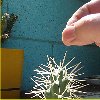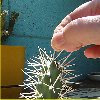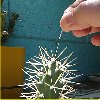
Picacho Peak Poppies
On a good year, the park at Picacho Peak between Phoenix and Tucson is
filled with flowers.

Picacho Peak White Poppies .
Had not encountered white poppies before. Would seem to be a good match for a desert climate though...

Mexican Golden Barrel Cactus

Century Plants
Sending up Flower Spikes

Century Plant Flowers

Hedge-Hog Cactus Blooms

Poppies and lupin

Lupin

Prickly Pear

Saguaros, Chain-fruit Cholla, Hedge Hogs (blooming). Superstition mountains in background

Globe Mallow

Globe Mallow?

Pincushion

Poppies in our back yard

Night blooming Cereus
These are in our yard. They bloom at night, always after sundown, then shrivel up before noon.

Night blooming Cereus
Note bloom on left that has already shriveled.

Staghorn Cholla

Hedge hog

Staghorn Cholla

Prickly Pear

Penstemon according to an Email I received from David Imus. Thanks David!

Beavertail

Lupin and pincushion

Staghorn Cholla

Staghorn Cholla

Beavertail

Beavertail

Bottle brush tree

Echinocereus Rubispinus (Fortunately this one was labeled.)

Prickly Pear

Hedge hog

Pincushion

Staghorn cholla
Green flowers? Whoever heard of green flowers?

Chain-fruit cholla
Blooming! I believe this is unusual. i.e., rare. Only once on a "really good year" did we find a chain-fruit cholla blooming. A "good year" has the right amount of rain at the right time in the winter...

Chain-fruit cholla
blooms!

Chain-fruit cholla
Bloom!

Pincushion

Small Cactuses

Chain Fruit Cholla - Often called "jumping cholla". Here is why. The thorns look pretty harmless. Big and fat...

But the big fat part is actually a thin, fat sheath! Sort of like the chaff or husk that covers a wheat grain. If you carefully pull on the sheath,

the real thorn is exposed. It is SHARP. Sharper than most needles. If you unwittingly push or lean against the big fat harmless-looking thorns, the real thorns puncture their sheaths then puncture you. The thorns have barbs. They have to be removed with pliers typically. The punctures then bleed typically. It is called jumping cholla because after you get stabbed and pull away, the part that has you breaks off of the main plant along with more of the main plant than you might expect. The separation causes momentum that drives more thorns from the newly separated parts of the plant the into you. These parts seem to "jump" toward you. You are then carrying a lot of really painful cactus around with you. If you are an animal and cannot free yourself, the stuff will eventually come loose and drop to the ground where it very well might take root and establish a new plant. That seems to be part of its mindless strategy...
 (NEW)
(NEW)Late August - Fishhook Barrel Cactus
 (NEW)
(NEW)Late August - Fishhook Barrel Cactus
 (NEW)
(NEW)Late August - Fishhook Barrel Cactus
 (NEW)
(NEW)Why its called a "Fishhook" Barrel Cactus. Barrel because its sort of barrel shaped. "Fishhook" because its thorns look like fishhooks. They curve on the end. Click on the image to see the high-resolution image and then look at the thorns. The fishhook shape is particularly noticable on the right side of the cactus where they are highlighted against the gravel.
